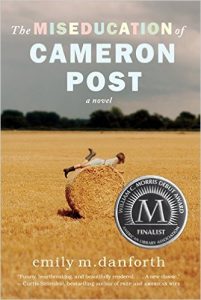
Book Review: The Glass Castle by Jeannette Walls
I am not certain I can truly write a review of The Glass Castle by Jeannette Walls. I can tell you it is a memoir, well written, and engaging. I can tell you I chose to read it because a friend “gushed” about it on Facebook. But I cannot honestly review the content of the book, because it gets all caught up in my emotional reaction to it. Which, in a way, is a sign of a pretty great book.
The Glass Castle is the story of Jeannette’s childhood with her dysfunctional parents and too functional (by necessity) siblings. My friend who loved it so much raced through and proceeded to convince her step-daughter to read it. I did not race through it. I had to put it down on occasion. I had to step back.
You see, I am a foster parent. My daughter was adopted from foster care when she was nine years old. Up until she was seven, she lived with her biological family. And the stories in The Glass Castle are spiritual relatives of the stories my daughter tells about her time before coming into care.
Throughout the book, I varied between wanting to sweep in and rescue these children from their situation and wondering if my daughter might actually have been better off staying in her biological family. It is an odd bit of pendulum swing.
The Walls children suffer from neglect. Their parents love them, that is never doubted, but their parents have almost no ability to actually care for them. There is some obvious mental illness, even if it is never referred to as such. There is alcoholism. And there is endangerment. And I want to sweep in and hold the kids close and tell them they are loved and safe and give them enough food to eat and the option to take a bath every night if they want…
But almost all the studies show that children do better if left in their biological families, even in cases of neglect (and sometimes even endangerment, as long as there is no actual abuse). And on some level, this story proves it. With the exception of the youngest child who essentially ran away from the family once she reached adulthood, we know that all the kids turned out ok – actually, more than ok. The author of the book is, well, an author of multiple books. The oldest sister is a respected illustrator. The brother is a police sergeant. The kids all turned out to have successful lives, and in many ways achieved their dreams. Would that have been the case had they been taken into state custody?
Which brings me back to my daughter. There were a couple additional issues in her family of origin, but were they actually that much worse than what happened in this book? I do not know. Would she be better off if she still lived with her biological mom, her sister and maybe one or both of her brothers? Her life would be different, yes. She would have less chance to actually be a kid, certainly. But would she have the anxiety and depression issues she faces now? Or were those caused or exacerbated by being removed from her family of origin, being separated from her siblings, having her role in life changed? Because you cannot tell me that being removed from your family at age 7 does not have a profound effect.
So as bad as things were in her family of origin, would my daughter actually be doing better if she had been left with her mother? Would her chances of growing up to be successful be better if she had had to weather the hardships of life in that family?
Please know I love my daughter more than just about anything. I love her so much that if I were able to go back in time and make it so that her mother was capable of caring for her and all of her siblings, I would, even though it would mean I would never get to hold her. But I cannot go back in time. And instead, I am left struggling, wondering if the right thing really was done for her and her siblings.
The Glass Castle is a wonderfully crafted story. And if you do not bring the baggage to it that I bring, it is probably an interesting look at the way people can thrive even in the most difficult surroundings, beautiful in much the same way as the Joshua tree their mother must absolutely paint early in the story. But if you are a foster parent, a social worker, or anyone who spends time working with kids in state care, it may be a tough read, and can certainly leave you wondering.


